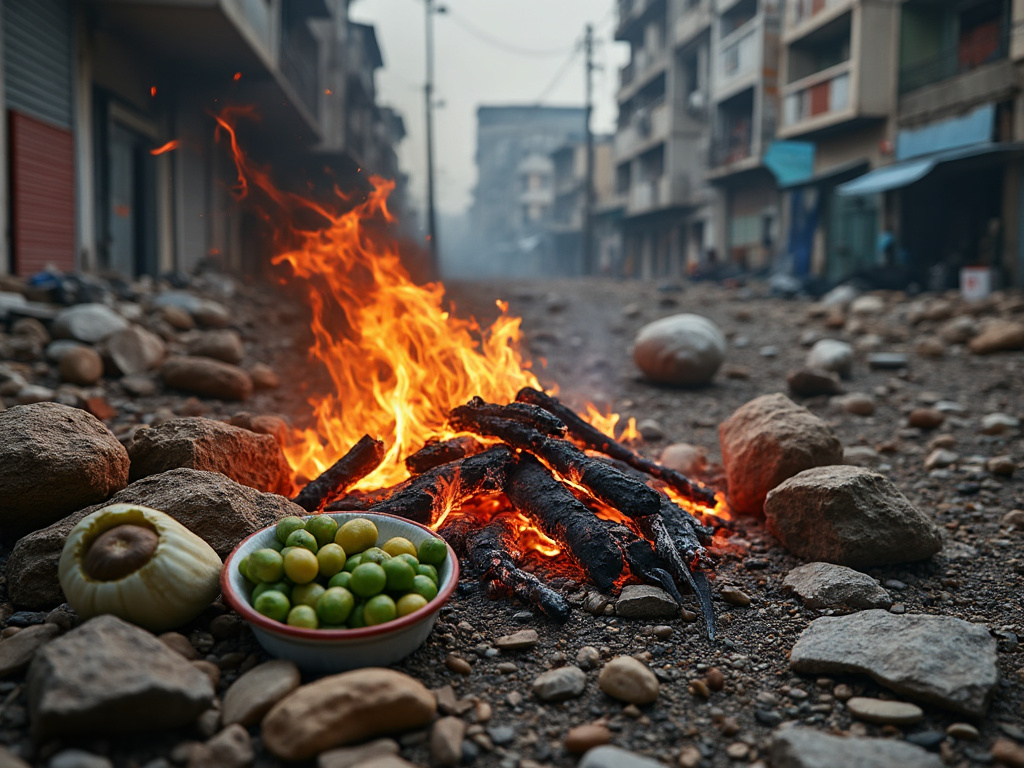
Severe Food Crisis in Gaza: Over Two Months of Aid Blockade
A growing humanitarian catastrophe sees families struggling to access food and clean water amid the ongoing blockade.
Gaza remains in a dire humanitarian situation as it has been over 70 days since any food or humanitarian aid has entered the territory.
The United Nations Relief and Works Agency for Palestine Refugees (UNRWA) reports that the population is increasingly facing starvation, with estimates indicating that around 500,000 people, roughly one in five residents, are now in a state of severe food insecurity.
Reports detail that families are surviving on dwindling supplies of canned goods, many of which have already been exhausted, as resources become increasingly scarce.
Residents in Gaza, such as those from the Abumarzouq family, are facing extreme challenges in accessing basic necessities.
Ahmed Abumarzouq, who relocated to Perth in 2015, has expressed deep concern for his family still in Gaza, stating that they are relying on contaminated water and meager remnants of canned food.
In one instance, a family member had resorted to walking several kilometers each day in search of food.
In light of these struggles, a UNRWA spokesperson indicated that some families are lucky if they can share even a single, inadequate meal per day.
This often results in sharing meager servings of items like canned beans amongst numerous family members.
Conditions have altered drastically since the blockade began, with makeshift kitchens closing and bakeries running out of flour, contributing to heightened food scarcity.
Reports indicate that food prices have soared; for instance, the cost of a single eggplant has reached $25. UNRWA has emphasized that the absence of fresh produce has exacerbated the crisis, with no fruits or vegetables available in the territory, leading to an overall prevalence of hunger.
Families resort to unconventional methods for cooking, including burning logs and plastic, due to a lack of gas and electricity, further complicating the situation.
The blockade has left the population in a precarious state, prompting concerns about the physical health and survival of the youngest members of society.
Many mothers reportedly struggle to nurse their infants due to inadequate nutrition.
Humanitarian agencies estimate that at least 600 truckloads of aid and supplies would be required daily to adequately address the urgent needs in Gaza.
Remarkably, this essential aid has been entirely absent since March 2, 2023.
Additionally, while Israeli authorities maintain there is no risk of famine and attribute food scarcity to Hamas's alleged misappropriation of aid, international organizations have criticized the plans to deliver aid as insufficient.
The World Health Organization has deemed the proposals inadequate to meet the urgent demands of the population, raising serious ethical and humanitarian questions surrounding the ongoing blockade and the tactics of warfare employed in this context.
As the situation develops, local residents remain in a desperate search for basic sustenance while grappling with the impacts of prolonged deprivation and humanitarian neglect.
The United Nations Relief and Works Agency for Palestine Refugees (UNRWA) reports that the population is increasingly facing starvation, with estimates indicating that around 500,000 people, roughly one in five residents, are now in a state of severe food insecurity.
Reports detail that families are surviving on dwindling supplies of canned goods, many of which have already been exhausted, as resources become increasingly scarce.
Residents in Gaza, such as those from the Abumarzouq family, are facing extreme challenges in accessing basic necessities.
Ahmed Abumarzouq, who relocated to Perth in 2015, has expressed deep concern for his family still in Gaza, stating that they are relying on contaminated water and meager remnants of canned food.
In one instance, a family member had resorted to walking several kilometers each day in search of food.
In light of these struggles, a UNRWA spokesperson indicated that some families are lucky if they can share even a single, inadequate meal per day.
This often results in sharing meager servings of items like canned beans amongst numerous family members.
Conditions have altered drastically since the blockade began, with makeshift kitchens closing and bakeries running out of flour, contributing to heightened food scarcity.
Reports indicate that food prices have soared; for instance, the cost of a single eggplant has reached $25. UNRWA has emphasized that the absence of fresh produce has exacerbated the crisis, with no fruits or vegetables available in the territory, leading to an overall prevalence of hunger.
Families resort to unconventional methods for cooking, including burning logs and plastic, due to a lack of gas and electricity, further complicating the situation.
The blockade has left the population in a precarious state, prompting concerns about the physical health and survival of the youngest members of society.
Many mothers reportedly struggle to nurse their infants due to inadequate nutrition.
Humanitarian agencies estimate that at least 600 truckloads of aid and supplies would be required daily to adequately address the urgent needs in Gaza.
Remarkably, this essential aid has been entirely absent since March 2, 2023.
Additionally, while Israeli authorities maintain there is no risk of famine and attribute food scarcity to Hamas's alleged misappropriation of aid, international organizations have criticized the plans to deliver aid as insufficient.
The World Health Organization has deemed the proposals inadequate to meet the urgent demands of the population, raising serious ethical and humanitarian questions surrounding the ongoing blockade and the tactics of warfare employed in this context.
As the situation develops, local residents remain in a desperate search for basic sustenance while grappling with the impacts of prolonged deprivation and humanitarian neglect.







